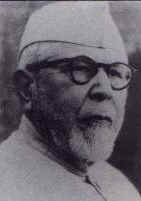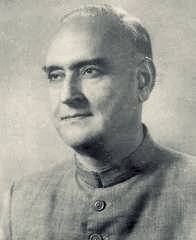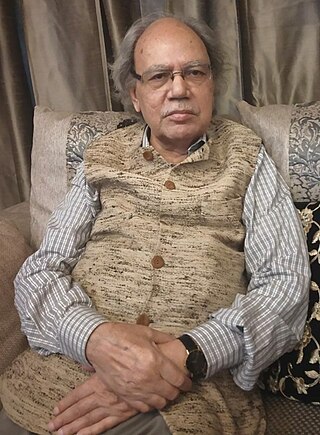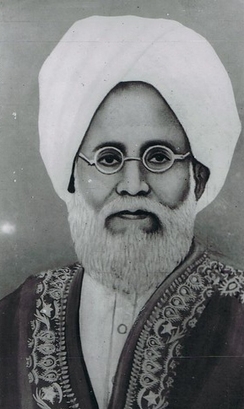Mohammad Mujeeb | |
|---|---|
| Born | 1902 India |
| Died | 1985 (aged 83) |
| Occupation(s) | Writer Educationist Scholar |
| Years active | 1926–1985 |
| Known for | Jamia Millia Islamia |
| Awards | Padma Bhushan |
Mohammad Mujeeb (1902-1985) was an Indian writer of English and Urdu literature, educationist, scholar and the vice chancellor of Jamia Millia Islamia, Delhi. [1] [2]
Mujeeb was born in 1902 [3] to Mohammad Naseem, a wealthy barrister from Lucknow.
Mujeeb studied history at Oxford University. He was a close friend and associate of Zakir Hussain, the third president of India, and Abid Husain. [4] Later, he did advanced training in printing in Germany before returning to India to join Jamia Millia Islamia in 1926 as a faculty member, along with Zakir Hussain and Abid Hussain. [5]
He was a scholar of History and was involved in the cultural and educational milieu of post-independent India. [1]
Padma Bhushan (1965) for his contributions to literature and education. [24]
Mujeeb died in 1985, at the age of 83. [25] Jamia Millia Islamia has instituted an annual oration, Professor Mohammad Mujeeb Memorial Lecture, in Mujeeb's honour. [26]

Zakir Hussain Khan was an Indian educationist and politician who served as the third president of India from 13 May 1967 until his death on 3 May 1969.

Jamia Millia Islamia is a central university located in New Delhi, India. Originally established at Aligarh, United Provinces during the British Empire in 1920, it moved to its current location in Okhla in 1935. It was given the deemed status by University Grants Commission in 1962. On 26 December 1988, it became a central university.

Khurshed Alam Khan was an Indian politician and a senior leader of the Indian National Congress political party.

Mahmud Hasan Deobandi was an Indian Muslim scholar and an activist of the Indian independence movement, who co-founded the Jamia Millia Islamia university and launched the Silk Letter Movement for the freedom of India. He was the first student to study at the Darul Uloom Deoband seminary. His teachers included Muhammad Qasim Nanautawi and Mahmud Deobandi, and he was authorized in Sufism by Imdadullah Muhajir Makki and Rashid Ahmad Gangohi.

Abdul Majeed Khwaja was an Indian lawyer, educationist, social reformer and freedom fighter from Aligarh. In 1920, he along with others founded Jamia Millia Islamia and later served its vice chancellor and chancellor.
Yusuf Husain Khan (1902–1979) was an Indian historian, scholar, educationist, critic and author. He mastered the languages of Arabic, English, French, Urdu, Hindi and Persian.

Mahmud Husain Khan was a Pakistani historian, educationist, and politician, known for his role in the Pakistan Movement, and for pioneering the study of social sciences. He served as Minister for Kashmir Affairs from 1951 to 1953 and Minister for Education in 1953.
Akhtarul Wasey is an Indian scholar and academician, who serves as the president of Maulana Azad University, in Jodhpur, India. He formerly served as professor of Islamic Studies at Jamia Millia Islamia in New Delhi, where he remains professor emeritus in the Department of Islamic Studies.
Masud Husain Khan was an Indian linguist, the first Professor Emeritus in Social Sciences at Aligarh Muslim University and the fifth Vice-Chancellor of Jamia Millia Islamia, a Central University in New Delhi.

Shamim Hanafi was an Indian Urdu critic, dramatist and a proponent of modernist movement in Urdu literature. His books on modernism include The Philosophical Foundation of Modernism and New Poetic Tradition. He was associated with the Jamia Millia Islamia to the extent of becoming a professor emeritus.
Zafar Ahmad Nizami was an Indian author, poet and writer. He served the Jamia Millia Islamia as Professor of Political Science for about 30 years and authored books like Memarān-e-Jamia, Hindustān ke chand Siyasi Rahnuma, Maulana Azad Ki Kahani and Tarīkh-e-Hind: Ahd-e-Jadeed.
Zayn al-Abidin Sajjad Meerthi (1910–1991) was an Indian Sunni Muslim scholar and historian and head of the Islamic studies department of Jamia Millia Islamia. His book Tarikh-e-Millat is required reading in the syllabus of Darul Uloom Deoband and in madrasas affiliated with it.

Mohammad Alvi was an Indian poet known for writing Urdu gazals, particularly a collection of Urdu gazals titled Chautha Aasmaan which became a subject of dispute between the Muslims scholars when he wrote a couplet titled "send a good prophet". He was later referred to as a "kafir" through a fatwa by the Imam of Jama Masjid in 1994, and he subsequently withdrew the line from his book after he was criticised by the Islamic theology school, Ahmedabad.

Muḥammad Ijteba Nadwi was an Indian Islamic scholar, who formerly headed the Arabic departments of Jamia Millia Islamia, Kashmir University and the Allahabad University.

Abdul Lateef Azmi was an Urdu litterateur and among the close associates of the founders of Jamia Millia Islamia. He joined Jamia Millia as a student of B.A. in 1936 and served the university over 50 years in various capacities. He was one of the longest serving editors of Jamia Millia's official magazine, Jamia. He died in Delhi on May 11, 2002. In 1985, Maktaba Jamia, New Delhi, published a book Abdul Lateef Azmi Hayat-o-Khidmat. Several scholars contributed chapters in the book on various facets of Abdul Lateef Azmi and his life.
Shah Jahan Begum was the Chancellor of Jamia Millia Islamia who served as the First Lady of India. She was the spouse of Zakir Husain.

This bibliography of Shibli Nomani is a selected list of generally available scholarly resources related to Shibli Nomani, a poet, philosopher, historian, educational thinker, author, orator, reformer, critic of orientalists and Islamic scholar from Indian subcontinent during the British Raj, regarded as the father of Urdu historiography. He didn't write an autobiography during his lifetime. However, he bequeathed it to his disciple Sulaiman Nadvi. Accordingly Sulaiman Nadvi composed Hayat-e-Shibli in 1943. This list will include his biographies, theses written on him and articles published about him in various journals, newspapers, encyclopedias, seminars, websites etc. in APA style.